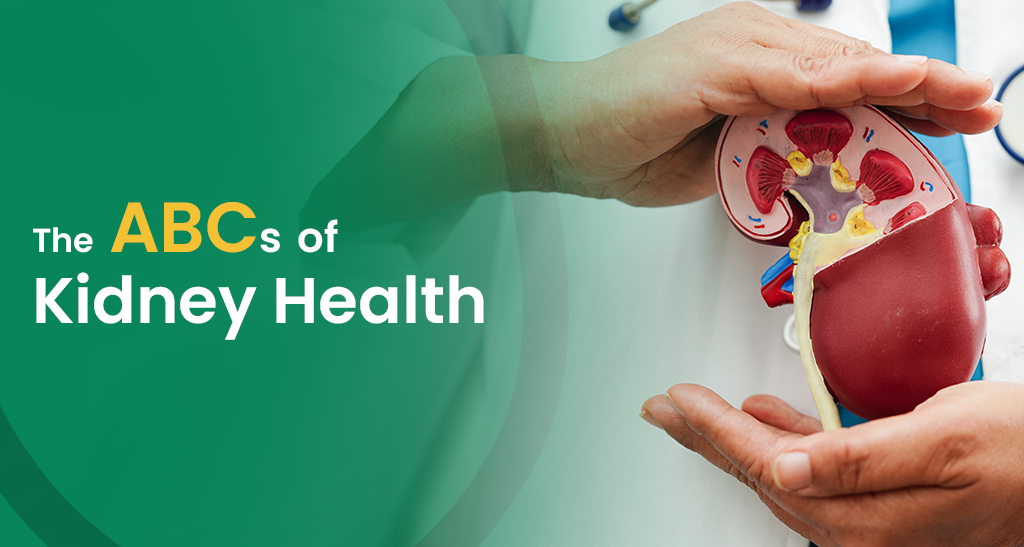Kidneys are bean shaped organs, located below the rib cage, that work tirelessly to filter toxins and waste from your blood. They play a pivotal role in maintaining the body’s equilibrium. In this blog, we shortly elaborate on the ABCs of the intricate organs and offer insights into kidney health as to how to keep them healthy!
How kidneys work
Blood enters the kidney through an artery, during which the blood is filtered by passing through millions of tiny filters. The filtered waste is sorted in the bladder and comes as urine from the urethra. The cleaned blood again enters the bloodstream via the vein. Kidneys filter approximately 200 quartzes of blood every day, of which 2 quartzes are excreted as urine.
Functions of Kidneys
The primary function of kidneys is regulating the bodily fluids and maintaining the right balance of fluids in our body additionally preventing us from becoming too dry or swollen.
- Kidney is the organ responsible for filtering out waste and toxins from the blood while they act as natural filters, removing harmful waste and toxins.
- Kidneys produce hormones that help regulate blood pressure.
- They play a role in turning vitamin D into its active form, which inturn keeps our bones healthy.
- Kidneys control essential minerals like sodium, phosphorus, and potassium in our blood.
- Controls the pH balance in blood.
- Make glucose if your blood doesn’t have enough sugar.
Early Signs and Symptoms of Kidney Disease
Watch for symptoms like
- Frequent urination
- Foamy urine
- Fatigue
- Lack of appetite
- Sleep issues
- Swollen ankles and feet
Tests for Kidney Diseases
Kidney Function Test – This test assesses how well your kidneys are working.
Urinalysis – A simple urine test can also reveal signs of kidney problems.
Blood Urea Test (BUN) – This blood test measures the levels of urea, a waste product, in your blood.
Serum creatinine Test – It checks the levels of creatinine, another waste product, in your blood.
Glomerular Filtration Rate (GFR) – Evaluates kidney function and determines the stage of kidney disease.
Kidney Ultrasound – An imaging test that provides a visual of your kidneys.
Risk factors for kidney disease
Various factors can significantly impact kidney health and cause kidney diseases
- Diabetes
- Blood pressure
- Cardiovascular Diseases
- Family history of kidney disease
- Abnormal Kidney structure
- Age
- Obesity
- Smoking
Complications arising from kidney disease
- Heart disease
- Heart attack and stroke
- High blood pressure
- Weak bones
- Nerve damage (neuropathy)
- Kidney failure (ESRD)
- Anemia
- Malnutrition
To Maintain Kidney Health
Control Blood Pressure:
High blood pressure and diabetes are the leading risk factors of kidney disease surely. High blood pressure damages the blood vessels in kidney over time and hence it reduces kidney’s ability to filter waste and toxins and regulates fluids. Therefore, to control your blood pressure, it’s important to adopt a heart-healthy lifestyle. While this includes reducing your salt intake, maintaining a healthy weight, and exercising regularly.
Maintain Blood Sugar:
Diabetes is a condition that can cause kidney damage over time, as high blood sugar levels can harm the small blood vessels in the kidneys evidently. To maintain healthy kidneys, individuals with diabetes should closely monitor their blood sugar levels from time to time.
Routine checkups:
Regular health checkups help catch kidney diseases early. Early detection also helps in early diagnosis and timely intervention.
Stay hydrated:
Kidneys require water to function properly. Therefore, staying hydrated is the first step to keeping your kidneys healthy. Drink enough water every day.
Healthy diet:
Consuming a balanced nutritious diet is beneficial for kidneys and overall health. It’s particularly important to reduce sodium intake and add healthy nutritious fruits and veggies in your diet.
Stay active:
Physical activity is essential for the kidney and overall health. Get regular exercise in moderation to keep your kidneys healthy.
Quit smoking and alcohol:
Smoking and alcohol consumption can worsen kidney health significantly over time. So, It’s essential to quit them to stay healthy.
Conditions and disorders of the kidneys
Kidney stones – Kidney stones are hard deposits of minerals and salts inside the kidney. They form over time.
Kidney infection (pyelonephritis) – Kidney infections are generally Urinary Tract Infection which moves upto the kidney.
Renal cysts – Renal cysts are fluid-filled sacs which gets formed in the kidney.
Polycystic Kidney Disease – Polycystic Kidney Disease is when cysts form outside the kidney. It lowers the kidney’s ability to function properly and causes kidney failure, if left untreated.
Chronic Kidney Disease – Chronic Kidney Disease is when the kidney takes too much damage and cannot function normally. It ceases to filter out waste and toxins causing a number of problems in the body subsequently.
In essence, understanding the role of kidneys, the problems kidney disease can cause, early signs, and conditions affecting kidneys is essential for maintaining good health. Therefore, regular checkups and simple lifestyle changes can go a long way to preserving your kidney health. Test your kidney health at Aarthi Scans and Labs.




